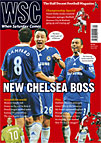 While the steel city rivals squabble, Doncaster’s pragmatism is paying off. Glen Wilson assesses the mood in South Yorkshire
While the steel city rivals squabble, Doncaster’s pragmatism is paying off. Glen Wilson assesses the mood in South Yorkshire
At the Keepmoat Stadium there is a bloke on my row who is notoriously hard to please. A frustrated yell of “No, not backwards” will greet any pass Doncaster Rovers play towards their own goal. Passes hit in the other direction are “just another bloody lump for’ards” while anything in between constitutes “fannying around with it”. In the midst of a poor run earlier this season we timed his first damning bellow of “Nooooo” at just 34 seconds after kick-off.
On Valentines Day however, even he, our staunchest critic, was rendered silent as Rovers recorded a first ever league victory over Sheffield Wednesday. It was not just the result which held his tongue, but the style in which it was achieved. Sean O’Driscoll’s Rovers have stuck by a philosophy of fluid football; this match showed it finally coming to deserved fruition.
Just over two years ago Jermaine Johnson, then of Bradford, meandered through Rovers’ defence like a World Cup skier negotiating slalom poles. A sign of the intermittent progress between then and now came late in the first half. With Rovers pinging the ball around to olés from the home fans Johnson, our former tormentor, was seen to offer a distinct “how the hell do I deal with this” shrug.
These are two clubs of different stature and inside one week in November two press reports illustrated their alternate approaches to Championship football. In Sheffield, chairman of supporters’ group Wednesdayite, Darryl Keys, took the speculate to accumulate approach: “The only realistic way to repay debts is to get back to the Premier League. And to do that there has to be investment in the squad.”
At Doncaster, reassuringly for a club who all too recently faced the football abyss, the approach was more pragmatic. “We don’t want to see this club start a season with minus ten or minus 17 or minus 30 points and I would sooner see us in the division below,” announced chief executive David Morris. “The way to end up with those minus figures is to keep throwing money at something in the hope that it will come right.” Premier League clubs would be advised to frame this statement and hang it in the boardroom.
Regardless of league position the general mood of Sheffield United fans always seems to suggest their club are having a torrid season. If the local health advisory board monitored the mood of callers to BBC Radio Sheffield’s Praise or Grumble phone-in there would not be a belt, tie or shoe-lace left in the red half of the city.
From the outside the Blades look frozen in the shadow of Neil Warnock’s tenure. The long drawn out battle against that relegation has dominated the club’s mindset over the subsequent season and a half to leave a side looking wistfully over its shoulder rather than facing the task ahead. Indeed, even with Warnock gone, when United hosted Rovers in January they adopted a playing style in tribute to Warnock’s personality: brash, direct, and industrious.
The two clubs’ defences reflect their prevailing styles; the Rovers back-four, with an average age of 24, is as competent on the ball as they are facing it. Sheffield United employ Chris Morgan. The end result was more doom-mongering grumbles on local radio and a first ever win at Bramall Lane for the Rovers.
Fans of both Sheffield clubs took defeat to Rovers graciously; a key sign that we’re the black sheep of the Championship’s South Yorkshire quartet. Home defeat to Barnsley three days later irritated Owls supporters considerably more, whilst two losses to Wednesday in a single season was of more pressing concern to United fans. The steel city derby will always dominate the minds of both, as illustrated by those Wednesday fans pausing on their trudge from the Keepmoat to purchase “Champions of Sheffield” T-shirts from street side entrepreneurs.
In ten years Doncaster have progressed steadily from the foot of the Conference to the Championship, although history and support base mean the Sheffield clubs will always hold sway in South Yorkshire. But as they continue to mark success or failure in relation to each other the weight of expectation and quest for one-upmanship that permeates the two clubs’ support means there is no time for patience.
This season Doncaster manager O’Driscoll was allowed to stick by his football principles and given time has steered Rovers back on course to stay up. Had he been in charge at either of the Sheffield clubs then he would most likely have been unemployed by Christmas. Even through his grey-tinted glasses of doom the bloke sat near me can see that regardless of which direction the ball is played in, it’s currently in Doncaster’s court.
From WSC 266 April 2009